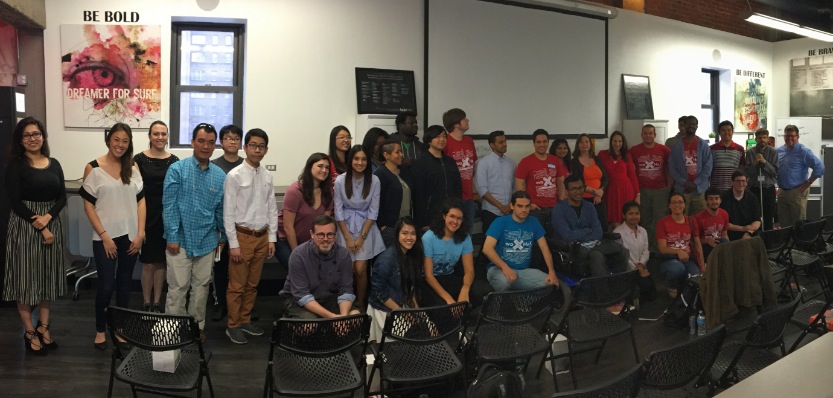To make a digital tool more accessible, sometimes you just have to make it simpler.
For screen readers, those crucial software tools that allow a blind person to surf the web with a speech synthesizer, nothing can be more challenging than a clunky website. For the most accessible video games, uncluttered game play is ideal.
So it’s no wonder that serious designers and developers who take an interest in accessibility often seem to have a mind for elegant solutions. Consider the projects that came this weekend from evoHaX, the yearly hackathon that was founded by developer and local digital accessibility advocate Ather Sharif. For the fourth year, the weekend project-build event was a featured part of the kickoff weekend of Philly Tech Week presented by Comcast.
By day a developer at Comcast Cable, Sharif, charming and self-effacing, led a team of volunteers and three dozen participants through a weekend that resulted in six projects. Austin Seraphin, one of the event’s judges and an established accessibility consultant, saw a theme between them and the Empathy Hack Workshop that also took part over the weekend as part of Philly Tech Week 2017.
“We see more and more about mindfulness and limiting distraction,” said Seraphin at the event. Simplicity works well at weekend hackathons, which often go from ideas on Friday night to product demos Sunday evening (though one local group is experimenting with a monthlong model).
Two teams took home prizes at evoHax. A set of Google Homes went to the team behind a project called TransitHaX that prototyped an app to pull out accessibility alerts, features and information for transit systems. For tops among the audience vote, a group of Drexel students won an Amazon Fire for their project called CoolCaptionator, a tool that transcribed audio files and added color to give emotional context.
In both cases, the projects were pulling out specific important information from bigger resources to aid people who might need that limited detail. The other projects followed suit.
Here’s an overview of the six completed projects:
- Spotlight: a prototype operating system that optimizes for simpler, more accessible interfaces that should improve workflow. For example, it features a simplified email interface.
- Transit Hax: an accessibility focused transit app that features maps of accessibility, auditory feedback on delays and station outages. (It has some of the spirit of Unlock Philly, a locally celebrated civic hacking success story.)
- BiteSized: a Google Chrome extension that serves a user just one paragraph at a time of a given article, aimed at both mindfulness and supporting various accessible-minded web readers.
- Praxis: an accessible website for educators to better understand the little-known disorder of alexia, a kind of dyslexia that can make reading challenging.
- MyHelp App: a tool for describing images.
- CoolCaptionator: a captioning tool that gives the emotional context of words using colors. Built by a group of self-titled Drexel hackers, the team used the IBM Watson API.
The event was held at the 1701 Walnut Street location of Benjamin’s Desk and featured sponsorship from Comcast, Google and Access Computing. In addition to Seraphin, the judges were City of Philadelphia Startup PHL head Archna Sahay, Philly Startup Leaders Program Director Lindsay Tsai, Comcast CAP Cloud Platforms Director Christopher Litsinger, Deaf-Hearing Communication Centre Executive Director Neil McDevitt and Briana Morgan, a public health planner.
Join the conversation!
Find news, events, jobs and people who share your interests on Technical.ly's open community Slack

Philly daily roundup: Earth Day glossary; Gen AI's energy cost; Biotech incubator in Horsham

Philly daily roundup: Women's health startup wins pitch; $204M for internet access; 'GamingWalls' for sports venues

Philly daily roundup: East Market coworking; Temple's $2.5M engineering donation; WITS spring summit


